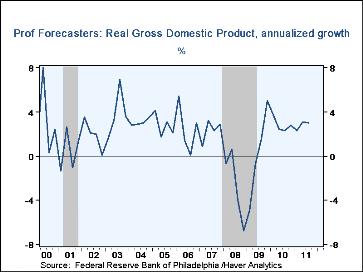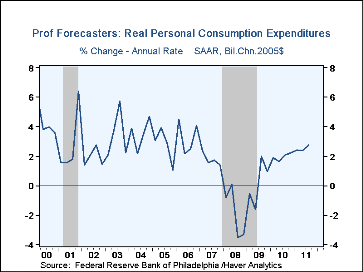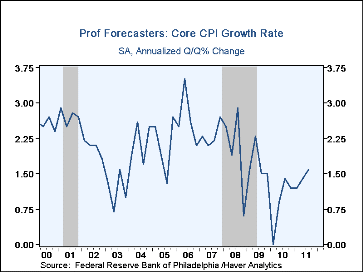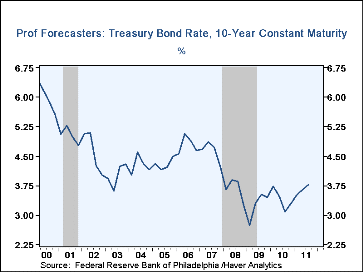 Global| Sep 21 2010
Global| Sep 21 2010U.S. Forecasts of Growth Mirror Recent Past
by:Tom Moeller
|in:Economy in Brief
Summary
Each quarter, the Federal Reserve Bank of Philadelphia surveys a group of professional forecasters to gain perspective on the outlook for the U.S. economy. In the August survey, the panel expected the current recovery to continue. [...]
Each quarter, the Federal Reserve Bank of Philadelphia surveys a group of professional forecasters to gain perspective on the outlook for the U.S. economy. In the August survey, the panel expected the current recovery to continue. Through the third quarter of 2011, real GDP growth is expected to average 3.0%, accelerating from 2.6% during the last four quarters. Last year at this time, forecasters correctly expected moderate overall economic growth due to reluctant consumers burdened by excessive levels of debt and housing activity that was depressed by overbuilding. Currently, expectations of a continuation of moderate economic growth stand in contrast to the usual pattern of acceleration to 6-7% which followed most past recessions.
Expected moderate growth is founded on consumer spending which remains burdened not only by too much debt but also by the aging of the "free-spending" baby-boomers. Expectations for improvement in consumption to under 3.0% is half the usual. The expected gain in housing is also subpar and by the end of next year will leave activity 50% below its 2005 peak. Only business investment growth of roughly 8.0% is on a par with other recoveries as past restructuring aids corporate profitability.
The lack of a swing towards faster inventory accumulation is also a large part of the subpar growth expectation for GDP growth. Accumulation is expected to be stable near a $60 billion annual rate which roughly equals last quarter. Foreign trade deficit improvement helped U.S. GDP growth in 2009 and in Q1 2010. However, that improvement ended last quarter and the real net export deficit is expected to remain roughly constant as foreign economies remain weak.
Moderate economic growth is expected to do little to reduce unemployment. The unemployment rate is expected to fall to just 9.0% by next year's third quarter.That remains the highest jobless rates since 1982-83 and reflects just roughly 1.0% growth in employment. Pricing power is thus expected to be severely constrained. The y/y growth in the overall GDP price deflator is expected to drift up to 1.5% from its low of 0.9% this year. Perhaps not-so-surprisingly, forecasters expect that lift to stem from a liquidity-driven rise in core consumer prices to 1.6% from 1.4% next quarter. Ten-year Treasury yields are expected to rise roughly 100 basis points to 3.8% by the middle of next year.
The full Third Quarter 2010 Survey of Professional Forecasters from the Federal Reserve Bank of Philadelphia is available here.
The data are available in Haver's SURVEYS database.
| FRB Philadelphia Survey of Professional Forecasters (AR) | Q3'10 | Q4'10 | Q1'11 | Q2'11 | Q3'11 |
|---|---|---|---|---|---|
| Real GDP | 2.3% | 2.8% | 2.3% | 3.1% | 3.0% |
| PCE | 2.1 | 2.2 | 2.4 | 2.4 | 2.8 |
| Non-Residential Investment | 8.3 | 8.8 | 8.8 | 5.8 | 7.7 |
| Residential Investment | -2.9 | 8.3 | 4.2 | 14.4 | 5.4 |
| Federal Government | 2.1 | 2.1 | 1.4 | 2.6 | 2.3 |
| Change in Business Inventories | $66.8B | $60.0B | $60.8B | $60.0B | $60.0B |
| Net Exports | -424.4B | -409.7B | -414.0B | -419.4B | -428.3.0 |
| Unemployment Rate (%) | 9.6 | 9.6 | 9.4 | 9.3 | 9.0 |
| Consumer Price Index (Y/Y, %) | 1.4 | 1.6 | 1.8 | 1.6 | 1.9 |
Tom Moeller
AuthorMore in Author Profile »Prior to joining Haver Analytics in 2000, Mr. Moeller worked as the Economist at Chancellor Capital Management from 1985 to 1999. There, he developed comprehensive economic forecasts and interpreted economic data for equity and fixed income portfolio managers. Also at Chancellor, Mr. Moeller worked as an equity analyst and was responsible for researching and rating companies in the economically sensitive automobile and housing industries for investment in Chancellor’s equity portfolio. Prior to joining Chancellor, Mr. Moeller was an Economist at Citibank from 1979 to 1984. He also analyzed pricing behavior in the metals industry for the Council on Wage and Price Stability in Washington, D.C. In 1999, Mr. Moeller received the award for most accurate forecast from the Forecasters' Club of New York. From 1990 to 1992 he was President of the New York Association for Business Economists. Mr. Moeller earned an M.B.A. in Finance from Fordham University, where he graduated in 1987. He holds a Bachelor of Arts in Economics from George Washington University.
More Economy in Brief
 Global| Feb 05 2026
Global| Feb 05 2026Charts of the Week: Balanced Policy, Resilient Data and AI Narratives
by:Andrew Cates










